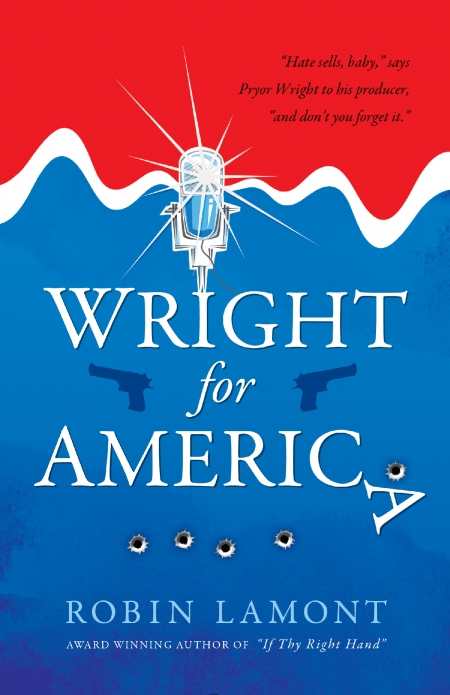Wright for America
For anyone who has ever longed to see one of those hatemongering, rightwing blowhards get their comeuppance, Robin Lamont’s Wright for America is that revenge fantasy come to print. The author has crafted a delightful, if at times wacky, tale that will leave her audience with a satisfied smile on their faces.
Lamont has limited that audience by aiming her attack against not just the obvious real life model for her obnoxious radio host, Pryor Wright, but also against those who agree with the venom he spews. Her story, however, is not mean-spirited; it is driven by a very personal quest of the heroine to put an end to the violence against homosexuals. Maren Garrity’s gay brother is badly beaten up by skinheads who chant “Wright for America” while committing their hate crime.
Lamont sets her book in New York City, a place she knows well from her varied careers in the Big Apple. The book has an authentic urban feel to it, exemplified by the theater crowd whose members play key roles in Garrity’s scheme to take down Mr. Wright.
There is also a parallel plot involving fashion knock-offs and black market gun-runners, and which involves a right-wing militia group, the Turkish mafia, and the FBI; and while at times so ludicrous as to be distracting, it eventually provides Lamont with an escape from the paper bag into which she has written the principal story. It also allows her to introduce a sweet and bumbling federal agent, and sets up the traditional rom-com “meet cute” between him and Maren.
Lamont’s style is light and breezy, and when she devolves into farce it is with the intention to entertain, which she does quite well. Many of her characters border on the stereotypical, but in this type of broad comedy such cliches can be forgiven. Pryor Wright, for example, has no redeeming social graces, and is “driven by an ego so outsized he has to call himself “El Magnifico.” He does not even believe the vitriol he spews, but spews it simply because “hate sells.”
This sentiment leads into the moral behind Lamont’s story, which is that “nobody understands that words have power.” Through Garrity, the author laments how Wright and others like him do not realize or care that words “can wound or tear down trust,” that “they are weapons-as much as a gun or a knife.” Her heroine does not set out upon a quest to destroy Wright, but simply to “stop him from hurting someone else.” Things, of course, spiral out of control, and eventually go from the barely believable to the totally outrageous, with every plot and subplot coming together into something resembling a Peter Bogdanovich farce.
The book plays out like a 1970s movie, and is paced accordingly. Lamont’s work appears to have been written with the goal or at least vision of it being turned into a screenplay, and as a result is very visual. Wright for America is not for everyone, but those for whom it is intended are likely to leave smiling.
Reviewed by
Mark McLaughlin
Disclosure: This article is not an endorsement, but a review. The publisher of this book provided free copies of the book and paid a small fee to have their book reviewed by a professional reviewer. Foreword Reviews and Clarion Reviews make no guarantee that the publisher will receive a positive review. Foreword Magazine, Inc. is disclosing this in accordance with the Federal Trade Commission’s 16 CFR, Part 255.

